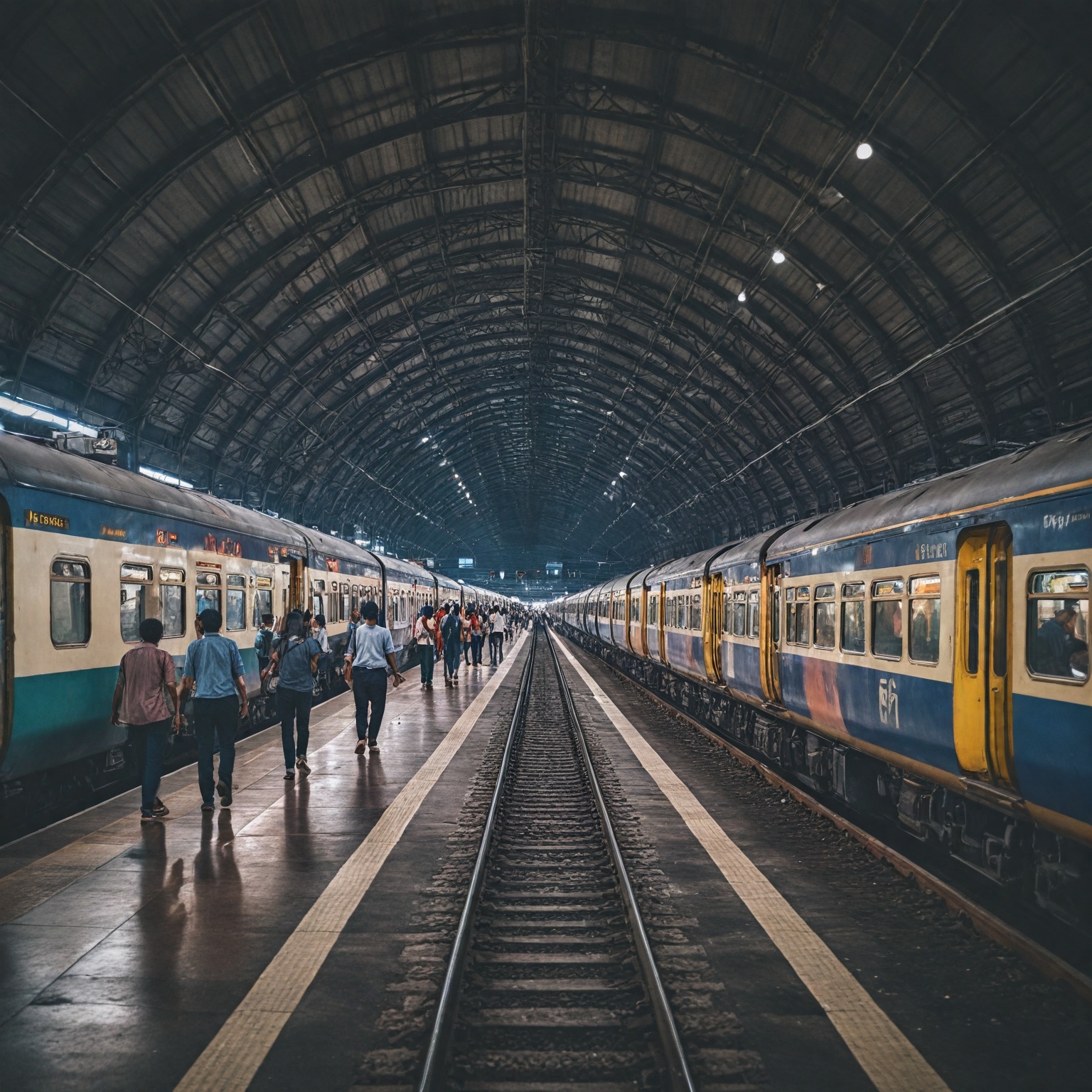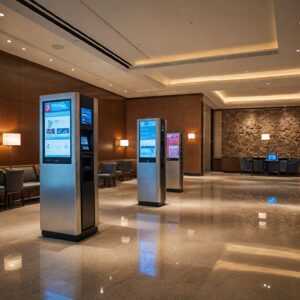Summary
The Indian Railways ticketing system, managed primarily through the Indian Railway Catering and Tourism Corporation (IRCTC), has undergone significant technological advancements aimed at improving passenger convenience and operational efficiency. Originally launched in 1985 and expanded nationwide with computerized systems in the 1990s, the platform has evolved into one of the largest e-commerce systems in Asia, serving millions of passengers daily across India’s extensive rail network. The introduction of the Next Generation e-Ticketing (NGeT) System in 2014 marked a major milestone, incorporating cloud-based infrastructure, enhanced security standards, and user-friendly features to handle increasing ticketing demands.
In recent years, Indian Railways has focused on revamping its ticketing interface to provide a faster, more seamless booking experience. Key improvements include a simplified user interface allowing journey detail modifications without login, a ‘Waitlist Prediction’ tool, multiple payment options including mobile wallets, and paperless ticketing delivered via email and SMS. Additionally, integration of cloud hosting has enhanced system scalability and reliability, reducing transaction failures especially during peak hours. Value-added services such as onboard meal bookings and berth preference selection further contribute to passenger satisfaction.
A prominent highlight of the overhaul is the modernization of the Tatkal booking system, which caters to last-minute travelers. Since late 2023, the system supports over 20,000 bookings per minute during peak hours, aided by staggered booking windows by travel class and mandatory Aadhaar linking to improve security and reduce server congestion. These changes address longstanding issues of server overload and long wait times, though challenges remain with ticket scarcity and occasional user experience frustrations.
Despite these advancements, the system faces criticism related to user interface limitations, session time-outs, and concerns over infrastructure scalability and ticketing fraud through automated bots. Indian Railways continues to pursue incremental technological upgrades and security enhancements to maintain its position as a leading digital ticketing platform in the region, striving to balance efficiency, accessibility, and passenger satisfaction amid growing travel demand.
Background
The Indian Railways passenger reservation system is one of the world’s largest, serving millions of travelers daily. It was initially launched in 1985, allowing passengers in major cities such as Delhi, Madras, Bombay, and Calcutta to reserve and cancel accommodation on any train from any terminal, which significantly enhanced convenience for travelers. This system was further expanded nationwide with the introduction of the computerized enhanced reservation and ticketing (CONCERT) network in 1995.
Handling immense volumes of passengers, Indian Railways accommodates about one million reserved ticket travelers and an additional sixteen million with unreserved tickets daily. To address the challenges of long queues and time-consuming manual processes at railway counters, a smart algorithmic approach was incorporated to streamline data processing and ticket booking activities.
In 1999, the Indian Railway Catering and Tourism Corporation (IRCTC) was established as a subsidiary of Indian Railways to manage online ticket booking, catering, and tourism services. IRCTC launched its online e-ticketing system in 2002, which has since evolved to meet the changing needs of passengers through multiple enhancements. Over the years, this platform has become one of the largest e-commerce websites in India and the Asia-Pacific region, facilitating fast and hassle-free ticket bookings and journey planning.
The original e-ticketing system was replaced by the Next Generation e-Ticketing (NGeT) System in April 2014, significantly increasing the capacity for ticket bookings per minute and introducing advanced features such as e-wallets, cancellation and refund options, and meal and accommodation bookings onboard trains. The NGeT system continuously undergoes updates to improve passenger convenience, including user-friendly layouts, journey detail modifications, fare breakup views, and transaction filtering.
Special focus has also been placed on enhancing the Tatkal reservation system, which caters to last-minute travelers. This system overhaul aims to improve emergency travel experiences by expanding availability, optimizing server performance, and introducing staggered booking windows based on travel class to distribute server load more effectively. Additionally, new rules such as mandatory Aadhaar linking for Tatkal bookings have been implemented to ensure secure and efficient ticketing.
Revamped Ticketing System
The Indian Railways has introduced a comprehensive overhaul of its ticketing system, aimed at providing passengers with a faster, more efficient, and user-friendly booking experience. This revamped platform, known as the IRCTC Next Generation e-Ticketing System (NGeT), incorporates advanced technology and cloud-based infrastructure to handle the massive volume of ticket bookings and passenger data processing with greater efficiency.
One of the key improvements in the new system is the user interface, which allows users to search for trains, check seat availability, and modify journey details without the need to log in initially. This facilitates easier access to information and reduces friction during the booking process. The system also supports a ‘Waitlist Prediction’ feature, enabling passengers to estimate the likelihood of their waitlisted or RAC (Reservation Against Cancellation) tickets getting confirmed—a particularly useful tool during peak travel seasons.
The revamped platform emphasizes paperless ticketing by delivering ticket details directly to passengers via email and SMS, eliminating the reliance on traditional printed tickets. This not only speeds up the booking and verification process but also contributes to environmental sustainability. Additionally, the integration of multiple payment options, including the ability to set preferred banks and use mobile wallets like the R-wallet, has streamlined transactions and enhanced convenience.
Further technological advancements include the deployment of cloud hosting services that ensure scalability and robust performance during high-demand periods, reducing transaction failures and allowing real-time availability updates. The cloud-based centralized data management system also supports security compliance standards such as ISO 27000, safeguarding passenger information.
Complementing the ticketing enhancements, IRCTC has incorporated value-added services such as meal bookings on select trains (e.g., Vande Bharat), berth preference selection through mobile applications, and integrated travel insurance options. These features collectively improve the overall travel experience by offering greater customization and support.
The introduction of these features is part of Indian Railways’ broader initiative to embrace digital transformation, reducing queues at reservation counters and meeting the growing demand for efficient passenger services. By leveraging intelligent data processing and advanced IT infrastructure, the revamped ticketing system aims to significantly ease the booking experience while maintaining security and reliability.
Faster Tatkal Booking
Indian Railways has significantly enhanced the Tatkal ticket booking experience, resulting in a substantial increase in booking capacity and efficiency. Since December 9, 2023, the system improvements have enabled over 20,000 bookings per minute during peak Tatkal hours, marking a remarkable upgrade in speed and reliability. This upgrade was supported by the implementation of the Next Generation E-Ticketing (NGeT) System from April 28, 2014, which progressively increased the per-minute ticket booking capacity.
To further optimize server performance and distribute the load more evenly, revised Tatkal ticket booking timings based on travel class were introduced effective May 30, 2025. This staggered scheduling helps reduce congestion on the booking platform and enhances accessibility for passengers across different classes. Additionally, the transition to cloud hosting has played a crucial role in improving scalability and reducing transaction failures. Cloud infrastructure supports faster booking processes and provides real-time availability, thereby improving the overall user experience during high-demand periods.
Despite the increased efficiency, passengers should note that Tatkal tickets are non-refundable once confirmed, and cancellations attract deductions as per IRCTC rules, with cancellations of waitlisted Tatkal tickets permitted up to 30 minutes before departure. While bookings through agents remain possible, the system encourages direct bookings to maximize efficiency and reduce bottlenecks.
These advancements collectively contribute to a smoother, faster, and more reliable Tatkal booking system, addressing previous challenges related to server overload and long wait times reported by users.
Implementation and Rollout
The Indian Railways has undergone a significant transformation in its ticketing system with the replacement of the original e-Ticketing System by the Next Generation E-Ticketing (NGeT) System on April 28, 2014. This upgrade progressively increased the capacity for per-minute ticket bookings, enabling the system to handle a larger volume of passengers efficiently. The NGeT system is cloud-based, leveraging modern technology to ensure scalability and reliability during peak booking hours, reducing transaction failures and improving the overall user experience.
A key component of this modernization is the Integrated Railway Helpline & Enquiry System (IRHES-139), which provides passengers with comprehensive railway information and assistance. The service has been enhanced with advanced technological features that incorporate APIs from various Indian Railways services such as PRS, UTS, Rail Madad, and NTES. This integration is achieved without occupying railway space or incurring additional costs and adheres to ISO 27000 IT security compliance standards, ensuring data protection and operational security.
Cloud hosting has played a pivotal role in the rollout, offering smooth scalability and centralized data management, which is essential for handling the vast passenger data in the Indian Railways network. This centralized approach allows for intelligent processing and timely retrieval of passenger information, contributing to better service efficiency and security against breaches.
Since its inception, the online reservation system managed by IRCTC has become one of the largest e-commerce platforms in the Asia Pacific region, reflecting the success of these technological initiatives. However, despite these advances, challenges remain in balancing demand and supply, especially during peak travel seasons. The introduction of Tatkal ticketing and advanced booking options aims to address this demand, although issues such as ticketing fraud by agents using automated bots continue to pose difficulties.
Impact and Reception
The revamped ticketing system introduced by the Indian Railway Catering and Tourism Corporation (IRCTC) has had a significant positive impact on the train ticket booking process, particularly during the highly competitive Tatkal booking hours. Since its implementation, the system has enabled more than 20,000 bookings per minute, drastically reducing the long wait times that passengers previously faced. This improvement has been widely welcomed by travelers, who now experience a smoother and faster booking process.
Passengers have appreciated several new features designed to enhance convenience and usability. For instance, the introduction of separate cards for each passenger allows for prefilled details and quicker ticket booking, while the ability to set preferred banks for payment streamlines the transaction process. Additionally, user-friendly displays of booking details and advanced filters for managing transaction history have improved the overall user experience.
The introduction of same-day refunds for Rail e-tickets where payment was deducted but tickets were not booked has further added to passenger satisfaction by minimizing financial uncertainties. Moreover, the new SMS service on Vande Bharat trains enabling confirmed passengers to book meals via a link sent by SMS demonstrates IRCTC’s commitment to leveraging technology for passenger convenience.
Challenges and Criticisms
Despite the advancements in the Indian Railways ticketing system, several challenges and criticisms persist. Users have frequently reported issues such as session time-outs and the use of CAPTCHA, which many find cumbersome and believe could be replaced by more user-friendly OTP-based authentication methods to streamline the booking process. The system’s inability to effectively save passenger and payment preference data has also been criticized, as this hampers the convenience and speed of ticket bookings.
Another major concern revolves around infrastructure scalability. Although the system integrates multiple APIs and operates on a cloud-based platform compliant with ISO 27000 IT security standards, there are questions about whether Indian Railways can adequately scale its infrastructure to meet fluctuating demand without causing service disruptions. Critics suggest a complete migration to cloud platforms to better handle such scale-up and scale-down requirements.
Furthermore, the scarcity of tickets, especially during peak periods, has led to roadblocks that some users interpret as deliberate hurdles to keep demand in check, adversely affecting user experience and accessibility. These challenges underscore the need for continuous improvements in both technological infrastructure and user interface to enhance overall efficiency and customer satisfaction.
Future Developments
Indian Railways continues to innovate its ticketing system with several future developments aimed at enhancing passenger convenience and operational efficiency. Building on the successful implementation of the Next Generation eTicketing System, ongoing upgrades are expected to introduce even more user-friendly features and technological enhancements. For instance, the revamped ticketing platform will further improve predictive capabilities, allowing passengers to better gauge the likelihood of confirmation for waitlisted tickets, thus reducing uncertainty during the booking process.
Moreover, payment options are set to become more flexible and personalized, enabling users to manage multiple preferred banks under their profile for quicker and seamless transactions. The focus on user experience will also extend to the display of booking details, making information more accessible and easy to comprehend post-payment. Alongside these digital improvements, Indian Railways is anticipated to continue strengthening the security and management of passenger data through advanced intelligent processing systems, addressing the challenges of handling millions of travelers and enhancing overall safety measures.
In addition, enhancements to ancillary services such as same-day refunds and SMS-based meal booking in premium trains like the Vande Bharat are likely to be expanded and refined to cover a broader range of services and routes. These future developments collectively aim to maintain Indian Railways’ position as one of the largest and most efficient e-commerce platforms in the Asia-Pacific region, while ensuring that passengers enjoy a smoother, faster, and more reliable ticketing experience.
























